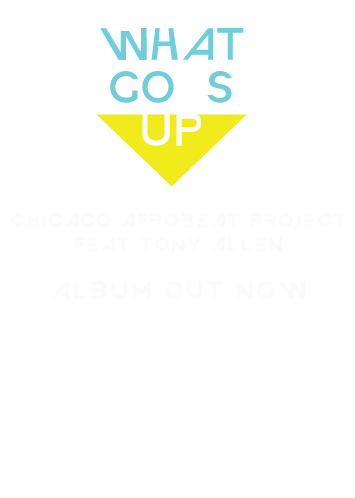This review originally appeared on iTunes and allmusic.com.
As a general rule, it’s always a good idea to avoid bands that include the word “Project” in their name. (That goes double if the other words in the name are “Alan Parsons.”) Calling your band a “project” implies a certain clinical bloodlessness, a form of studious inquiry that’s antithetical to good old-fashioned rocking. (Again, see also: Alan Parsons Project.) But the first rule of rule-making is that there are always exceptions, and the Chicago Afrobeat Project is one glorious exception. A multi-racial collective that expands and contracts between half a dozen members and three times that many, the Chicago Afrobeat Project takes the 1970’s sound of Fela Kuti, King Sunny Ade, and Thomas Mapfumo as their philosophical starting point. Rather than aiming for an academic re-creation of vintage Afrobeat (or worse, mainstream dance pop that’s “influenced” by Afrobeat), however, the group incorporates modern jazz, Tortoise-style post-rock, big band Latin funk, and other influences into the core Afrobeat style. As a famously polyglot style to begin with — Fela and King Sunny Ade themselves claimed influences ranging from James Brown to Hank Williams — Afrobeat can expand to hold all these and more, but the rippling highlife guitar and call-and-response vocals of a song like “Jekajo” remain incontrovertibly the real thing. These seven gloriously danceable tracks, powered by honking sax sections, funky electric piano solos, and hypnotic percussion grooves, may not be as swaggeringly powerful as Fela Kuti, as beneficient as King Sunny Ade, or as righteously defiant as Thomas Mapfumo at their respective peaks, but they’re highly recommended both for fans and newcomers to the style alike.

 The new CAbP 35′ Bluebird Bus is heading out for its first tour with the band this weekend. We’ve got shows in Nashville, Atlanta (at a Brave’s game), Decatur GA, and finally in Charleston SC. Stop by the RV for some strawberry/banana daquiris.
The new CAbP 35′ Bluebird Bus is heading out for its first tour with the band this weekend. We’ve got shows in Nashville, Atlanta (at a Brave’s game), Decatur GA, and finally in Charleston SC. Stop by the RV for some strawberry/banana daquiris.